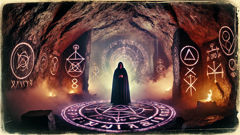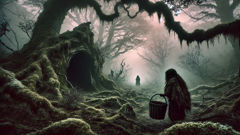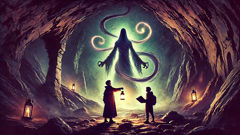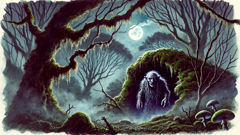Introduction
In the southern reaches of Chile, where emerald forests meet the endless Pacific and the air tastes of salt and rain, the Chiloé Archipelago is a world all its own. Its people have long whispered stories that cling to the thick coastal fog, weaving legends from the mossy woods and moss-draped trees that blanket the land. Among these stories, none are more haunting or enigmatic than that of the Imbunche—a creature whose very name stirs unease in the hearts of children and adults alike. Unlike the specters that prowl the edges of dreams, the Imbunche is a being of flesh and sorrow, a twisted guardian bound to darkness and secrecy. Long ago, before Spanish ships ever cut through the mists, a tangled network of brujos—sorcerers—practiced ancient arts in hidden caves, their rituals echoing through the labyrinthine woods. To protect their secrets, the brujos needed more than locked doors or clever traps; they required a living sentinel, one neither entirely human nor fully beast. Thus, the tale of the Imbunche was born: a child taken or offered, transformed through cruel sorcery into a huddled, deformed warden, its mouth sewn shut, its body contorted, and its humanity smothered under layers of magic and pain. But even in this world of curses and shadowy bargains, the Imbunche’s story is not merely one of fear. It is a story of transformation—of loss and longing, of the choices that echo through generations, and of the rare spark of redemption that may yet break through the thickest mist. As the villagers of Chiloé light their fires against the night, the legend continues to grow, winding its way through the woods, into the darkened cave mouths, and, perhaps, toward an unexpected hope.
The Brujo’s Bargain
Before dawn, the forests of Chiloé thrum with a living quiet, the kind that thickens between the trunks and seems to breathe. This was the realm of the brujos, masters of the island’s oldest secrets. Among them, Don Mateo stood apart: a sorcerer both respected and feared, known for his wisdom and his willingness to do what others dared not. Deep in a forest glade, Don Mateo’s cave yawned beneath tangled roots—a sanctuary of forbidden rites and a treasury of whispered knowledge. The brujos met here under the cloak of mist, far from the prying eyes of villagers and priests alike.

On a night swollen with fog, Don Mateo faced an unspoken dilemma. His power was growing, but so too were threats: rival sorcerers, envious townsfolk, even those who would betray their own kind for a taste of power. He needed a guardian for his secrets—one who would obey without question, who would frighten away any intruder, yet never betray the cave’s location. The ancient texts spoke of the Imbunche: a guardian fashioned not from stone or spell alone, but from a living soul reshaped by arcane arts. It was a choice weighted with darkness—a spell that would bind a human child into a monster.
In a nearby village, a poor couple faced desperation. Their only son, Pedro, was a quiet child with wide, searching eyes and a mind attuned to the woods. Illness had taken most of their crops, and hunger pressed at their door. In the old ways, a family might offer a child to the brujos for protection—a custom both feared and half-remembered. The brujos promised safety, sometimes prosperity, in return. But the price was steep.
That night, the couple approached Don Mateo’s cave, carrying Pedro in their arms. They pleaded for help, their voices quavering in the thick fog. Don Mateo listened, weighing their pain against his own need. He spoke of the pact: their son would be changed, forever lost to them, but their home would be safe from all harm. The couple hesitated, tears streaking their cheeks, but despair overcame hope. They agreed. The spell began before dawn. In the depths of the cave, surrounded by symbols daubed in ochre and blood, Don Mateo chanted the words of binding. Pedro’s body twisted and shrank, his joints bending unnaturally. Don Mateo sealed his lips with black thread and anointed his flesh with bitter oils. When the ritual ended, Pedro was gone. In his place crouched the Imbunche: a creature with one leg twisted over his back, his mouth sewn shut, his gaze haunted but watchful. The brujos presented him with scraps of meat and orders to guard the cave. As dawn broke, Don Mateo gazed upon his creation and felt the weight of every word he had spoken.
The Guardian in the Mist
The years passed as they always do in Chiloé: slowly, under a veil of rain and wind. The Imbunche became legend even as he lived it, his presence a silent warning to all who neared the forbidden glade. To the villagers, the woods near Don Mateo’s cave became a place of dread; children dared each other to approach, but none ventured too close. At night, stories drifted from hearth to hearth—of the Imbunche’s twisted form glimpsed between trees, of cries that might be wind or something more.

Inside the cave, time moved differently for the Imbunche. Though his mind remained sharp, his body obeyed other laws. He crawled and hobbled through tunnels, his senses attuned to the smallest vibrations: the drip of water, the slither of a rat, the distant footfalls of intruders. He remembered flashes of his past life—a mother’s lullaby, the rustle of corn in the wind—but these faded like dew in sunlight. Instead, his world narrowed to hunger, darkness, and obedience.
Don Mateo visited rarely now, leaving food and muttered instructions at the threshold. The Imbunche never questioned, never spoke. Yet somewhere in the murky depths of his heart, a longing pulsed: a memory of warmth, of belonging, that the spell could not fully erase. The villagers, meanwhile, spun tales of what might happen if the Imbunche were angered—would he curse them, or worse, would he break free?
One evening, as the sun bled into the sea and the sky turned coppery gray, a new sound entered the Imbunche’s world. It was not the cautious tread of Don Mateo, but a lighter step, hesitant and curious. A child—Marina, from a distant village—had wandered too far in search of wild berries. The Imbunche watched her through a slit in the stone, his heart thumping with a strange fear. She carried a woven basket and sang softly to herself, unaware of the eyes upon her. The Imbunche felt an ache he could not name. For the first time in years, a tear welled in his sewn-shut eyes. When Marina neared the cave, she stumbled and fell, crying out in pain. The Imbunche crept closer. He wanted to comfort her, but his monstrous form sent her running back into the woods. Still, her song lingered in the air, piercing the heavy fog and reaching something deep within the guardian’s soul.
Breaking the Spell
Days bled into nights, and Marina’s song haunted the Imbunche’s dreams. Something had shifted. Each time Don Mateo brought food, the Imbunche waited for a word or a glance, but the sorcerer remained distant, preoccupied with storms brewing among the brujos. Alone, the Imbunche began to test his boundaries—pressing against the magic that bound him, searching for a weakness in the spell.

One storm-lashed night, Don Mateo arrived agitated. Rumors spread of rival brujos seeking to seize the cave’s secrets. He ordered the Imbunche to stand guard and vanished into the woods. That night, as thunder cracked above and rain battered the earth, Marina returned. This time, she was not alone. Her brother, Gabriel, a bold and curious youth, had followed her tales of the forest’s monster.
Gabriel stepped boldly to the cave’s mouth, lantern held high. "Show yourself!" he demanded, his voice trembling with both fear and defiance. The Imbunche hesitated, drawn by the courage in the boy’s tone. He emerged into the lantern’s glow—an apparition of twisted flesh and sorrowful eyes. Gabriel staggered back, but Marina clutched his hand. "He’s not a monster," she whispered. "He cried when I fell."
Gabriel looked into the Imbunche’s eyes and saw something—pain, yes, but also pleading. They approached slowly. The Imbunche could not speak, but he gestured awkwardly toward the cave, toward the place where Don Mateo kept his grimoire—the source of many spells, including his own curse.
Inside, Gabriel found the book and leafed through its brittle pages by lantern-light. The children read aloud the words that could undo the binding, their voices weaving hope into the gloom. The Imbunche wept silent tears as the magic loosened its grip. The threads over his lips unraveled; his limbs began to straighten with every syllable. At dawn, as the first birds sang, the Imbunche was no more. In his place stood Pedro—older than when he was taken, but unmistakably human.
Don Mateo returned to find the cave empty but for scattered pages and fading echoes. His power had waned; his secrets no longer protected by fear. Marina and Gabriel led Pedro back to their village, where astonishment and wariness greeted them. Some feared what Pedro might bring, but others saw in him the promise of forgiveness—for the village, for themselves, and even for Don Mateo, who vanished into the mists, never to be seen again.
Conclusion
Pedro’s return was not simple, nor was it easy. Some villagers averted their eyes; others brought him gifts or food in awkward silence. Yet over time, suspicion softened into acceptance. Pedro never forgot the darkness or the pain of his transformation, but he also remembered Marina’s kindness and Gabriel’s bravery. He became a quiet figure in the village, tending to those in need and teaching children to respect both magic and the natural world. Stories of the Imbunche shifted; now they spoke not only of fear, but of redemption—a living soul reclaimed from shadow. In the forests of Chiloé, moss still drapes the trees and mist still curls between roots. But sometimes, when dawn pierces the fog and birds sing above the ancient caves, the villagers remember that even legends as dark as the Imbunche’s can change. Magic remains—a force for fear or hope, as people choose to wield it. And deep in those woods, where secrets linger and new stories begin, Pedro’s tale endures: a warning, a comfort, and a testament to the possibility of forgiveness.













